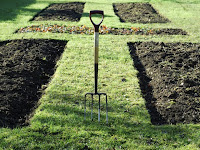Find the sun. Most vegetables want six hours of direct sun a day — and more if they can get it. Exceptions include lettuce and radishes, which can get by with less.
Start small. If you're beginning your first garden, help yourself avoid the feeling of being overwhelmed with weeding and general maintenance. You can grow a surprising amount of food in a bed just 10-foot square.
Build up your soil. The foundation of a healthy, productive garden is a rich, well-draining, crumbly soil that has good tilth. Liberally add organic matter such as finished compost, bagged humus and straw.

Time your crops. Soil temperatures matter as much as air temperature when you're planting. Even peas, which are spring crops that are resistant to light frost once they're growing, won't germinate when the soil is below 39 degrees.
Be ready to supply cover if a late frost hits. Here, early-spring veggies grow under plastic.
Mulch, mulch, mulch. You wouldn't think twice about mulching your ornamental beds, so do the same with your veggie and fruit plantings. Keeping a layer of organic mulch over this radicchio's shallow roots helps conserve moisture and suppress weeds.
Anticipate animals pests. To a raccoon these young corn plants mean dinner in the making, once the ears are fully developed. Talk to your neighbors and try to learn what pests to expect in your area. With the right kind of fencing, you can deter raccoons, rabbits, groundhogs, deer, dogs and other unwelcome visitors.
Mingle your plants. Too much of the same kind of plant in a grouping sends "eat here" messages to bad bugs. Here, squash, peppers and beans share the space.
Stay on top of the harvest. Pick produce when it's ready. Removing beans as they mature allows more of the plant's energy to go into supporting the later fruit that forms.
You don't have to hide your vegetable garden. Where you can, find a way to integrate your fruit and veggie garden with an area of your yard where you tend to hang out. When the crops are close at hand, you're much more likely to pluck off a bad bug or give a thirsty plant a drink.










No comments:
Post a Comment